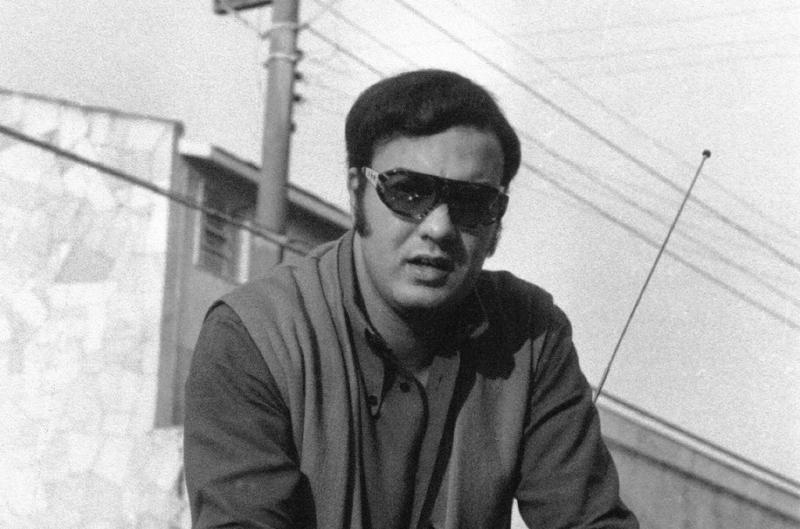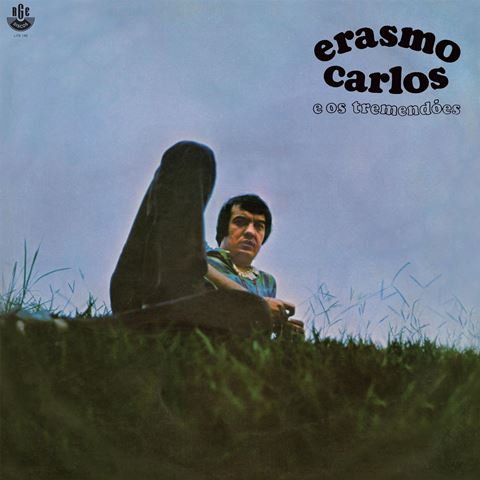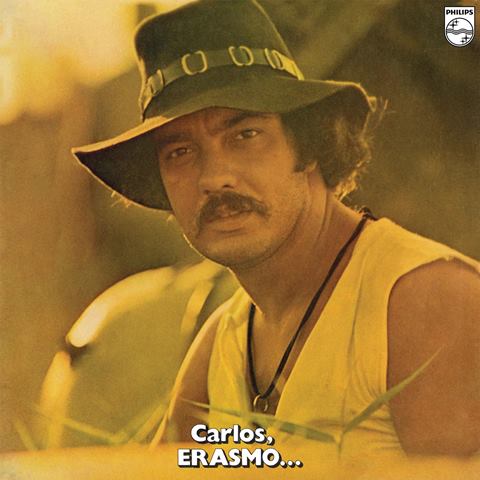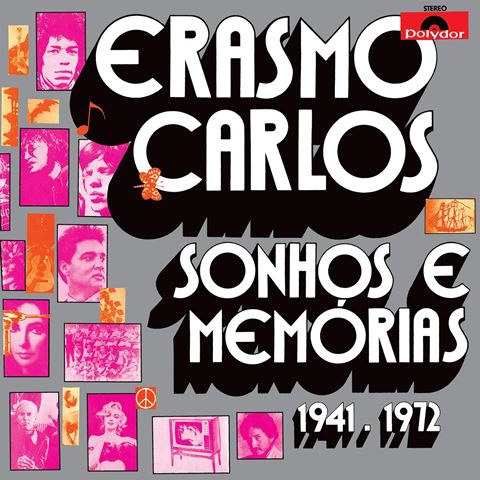Reissue CDs Weekly: Erasmo Carlos | reviews, news & interviews
Reissue CDs Weekly: Erasmo Carlos
Reissue CDs Weekly: Erasmo Carlos
Surprise reappearance of hip early Seventies albums from the Brazilian popster

Erasmo Carlos got his break in August 1965 when the TV show Jovem Guarda (The Young Guard) began its run. Filmed before a live audience in São Paulo and broadcast nationally, it was pop as never seen before in Brazil.
The programme though was axed in 1968, just before President Colonel Arthur da Costa e Silva’s declaration of a state of siege, suspension of the constitution and the assumption of emergency powers. The crunch date was 13 December 1968. da Costa e Silva had taken power in 1964, following the coup-d’état. What followed the December decree – the Ato Institucional Número Cinco – was clamp-down, repression and, soon, an artistic exodus from the country. The Tropicália musicians Gilberto Gil and Caetano Veloso became exiles but the mainstream Erasmo Carlos stayed in Brazil and kept on with pop.
 Up to the end of 1968, Erasmo Carlos had made six stylistically varied pop albums but the new reissues of Erasmo Carlos E Os Tremendões (1970), Carlos, ERASMO... (1971) and Sonhos E Memórias 1941-1972 (1972) cover what happened next for him, after da Costa e Silva’s tightening of the screws. Each reissue’s booklet includes a dense liner note appended with a song-by-song discussion. The lyrics are also included in Portuguese and in English translations.
Up to the end of 1968, Erasmo Carlos had made six stylistically varied pop albums but the new reissues of Erasmo Carlos E Os Tremendões (1970), Carlos, ERASMO... (1971) and Sonhos E Memórias 1941-1972 (1972) cover what happened next for him, after da Costa e Silva’s tightening of the screws. Each reissue’s booklet includes a dense liner note appended with a song-by-song discussion. The lyrics are also included in Portuguese and in English translations.
Carlos was and is a pop singer and songwriter, but his music was affected by what was happening to Brazil and the albums chart his artistic evolution. They also chart his increasing hairiness. On the sleeve of …E Os Tremendões, he is clean shaven with side-parted hair. By the time of Carlos, ERASMO..., a moustache has sprouted. For the inner sleeve of Sonhos E Memórias 1941-1972, he is bearded and sitting cross-legged beside a tent with an acoustic guitar.
 As the album with the least hirsute cover look, …E Os Tremendões is also the one most like his previous, 1968 and earlier, releases. It is, as the liner notes put it, “like an attempt to appeal to nearly every relevant genre of Brazilian popular music at the turn of the decade.” A version of Veloso’s “Saudosismo” is sound, but not overly striking. Dips into soul sit alongside glutinous, string-laden ballads. While stylistically of its time, Erasmo Carlos E Os Tremendões does not make the case that the 1970 Erasmo Carlos was much different to that of the Jovem Guarda era.
As the album with the least hirsute cover look, …E Os Tremendões is also the one most like his previous, 1968 and earlier, releases. It is, as the liner notes put it, “like an attempt to appeal to nearly every relevant genre of Brazilian popular music at the turn of the decade.” A version of Veloso’s “Saudosismo” is sound, but not overly striking. Dips into soul sit alongside glutinous, string-laden ballads. While stylistically of its time, Erasmo Carlos E Os Tremendões does not make the case that the 1970 Erasmo Carlos was much different to that of the Jovem Guarda era.
Carlos, ERASMO... is different. Tropicália runs through the album. The movement’s Manoel Barenbein, as co-producer, and Rogério Duprat, as arranger, worked on it. Sergio Dias, Dinho Leme and Liminha from Os Mutantes play on it. So does Gal Costa/Veloso guitarist Lanny Gordin. The all-original songs have the unmistakable melodic playfulness of Os Mutantes but, overall, the sound is smooth: Carlos was dipping his toe into new waters without getting too wet. Not only is the great Carlos, ERASMO... a co-opting of Tropicália, it posits where the sound could have gone had it embraced the mainstream.
 Where Carlos went next was further into his mostly mellow take on freakdom. Sonhos E Memórias 1941-1972 is a summing up of where he had arrived musically in 1972, but does not – apart from the parodic Beatles and Elvis-referencing “Bom Dia, Rock ‘n’ Roll” – have the scattershot nature of his albums up to and including …E Os Tremendões. Cohesiveness comes through backing from the trio who formed fusion outfit Azymuth the next year. Carlos’s songwriting is hot too. The dense, swirling, Abbey Road/Nascimento-eque “Minha Gente” is a highlight, as is the delicate, misty “Meu Mar”. A terrific album.
Where Carlos went next was further into his mostly mellow take on freakdom. Sonhos E Memórias 1941-1972 is a summing up of where he had arrived musically in 1972, but does not – apart from the parodic Beatles and Elvis-referencing “Bom Dia, Rock ‘n’ Roll” – have the scattershot nature of his albums up to and including …E Os Tremendões. Cohesiveness comes through backing from the trio who formed fusion outfit Azymuth the next year. Carlos’s songwriting is hot too. The dense, swirling, Abbey Road/Nascimento-eque “Minha Gente” is a highlight, as is the delicate, misty “Meu Mar”. A terrific album.
Although Erasmo Carlos is a household name in Brazil, he isn’t well known beyond its borders and the international reappearance of these three albums is a surprise, albeit a pleasant one. They can’t be classified as world music, don’t have the hip cachet of Tropicália and lack the artistic credibility of Bossa Nova or, say, the unclassifiable Lô Borges and Milton Nascimento, who both continued working in Brazil during this period.
But being known beyond one’s own borders is no measure of quality. Carlos, ERASMO... and Sonhos E Memórias 1941-1972 are the essentials, and those with any interest in the best of Brazilian music need them.
The future of Arts Journalism
You can stop theartsdesk.com closing!
We urgently need financing to survive. Our fundraising drive has thus far raised £49,000 but we need to reach £100,000 or we will be forced to close. Please contribute here: https://gofund.me/c3f6033d
And if you can forward this information to anyone who might assist, we’d be grateful.

Subscribe to theartsdesk.com
Thank you for continuing to read our work on theartsdesk.com. For unlimited access to every article in its entirety, including our archive of more than 15,000 pieces, we're asking for £5 per month or £40 per year. We feel it's a very good deal, and hope you do too.
To take a subscription now simply click here.
And if you're looking for that extra gift for a friend or family member, why not treat them to a theartsdesk.com gift subscription?
more New music
 'Vicious Delicious' is a tasty, burlesque-rockin' debut from pop hellion Luvcat
Contagious yarns of lust and nightlife adventure from new pop minx
'Vicious Delicious' is a tasty, burlesque-rockin' debut from pop hellion Luvcat
Contagious yarns of lust and nightlife adventure from new pop minx
 Music Reissues Weekly: Hawkwind - Hall of the Mountain Grill
Exhaustive box set dedicated to the album which moved forward from the ‘Space Ritual’ era
Music Reissues Weekly: Hawkwind - Hall of the Mountain Grill
Exhaustive box set dedicated to the album which moved forward from the ‘Space Ritual’ era
 'Everybody Scream': Florence + The Machine's brooding sixth album
Hauntingly beautiful, this is a sombre slow burn, shifting steadily through gradients
'Everybody Scream': Florence + The Machine's brooding sixth album
Hauntingly beautiful, this is a sombre slow burn, shifting steadily through gradients
 Cat Burns finds 'How to Be Human' but maybe not her own sound
A charming and distinctive voice stifled by generic production
Cat Burns finds 'How to Be Human' but maybe not her own sound
A charming and distinctive voice stifled by generic production
 Todd Rundgren, London Palladium review - bold, soul-inclined makeover charms and enthrals
The wizard confirms why he is a true star
Todd Rundgren, London Palladium review - bold, soul-inclined makeover charms and enthrals
The wizard confirms why he is a true star
 It’s back to the beginning for the latest Dylan Bootleg
Eight CDs encompass Dylan’s earliest recordings up to his first major-league concert
It’s back to the beginning for the latest Dylan Bootleg
Eight CDs encompass Dylan’s earliest recordings up to his first major-league concert
 Ireland's Hilary Woods casts a hypnotic spell with 'Night CRIÚ'
The former bassist of the grunge-leaning trio JJ72 embraces the spectral
Ireland's Hilary Woods casts a hypnotic spell with 'Night CRIÚ'
The former bassist of the grunge-leaning trio JJ72 embraces the spectral
 Lily Allen's 'West End Girl' offers a bloody, broken view into the wreckage of her marriage
Singer's return after seven years away from music is autofiction in the brutally raw
Lily Allen's 'West End Girl' offers a bloody, broken view into the wreckage of her marriage
Singer's return after seven years away from music is autofiction in the brutally raw
 Music Reissues Weekly: Joe Meek - A Curious Mind
How the maverick Sixties producer’s preoccupations influenced his creations
Music Reissues Weekly: Joe Meek - A Curious Mind
How the maverick Sixties producer’s preoccupations influenced his creations
 Pop Will Eat Itself, O2 Institute, Birmingham review - Poppies are back on patrol
PWEI hit home turf and blow the place up
Pop Will Eat Itself, O2 Institute, Birmingham review - Poppies are back on patrol
PWEI hit home turf and blow the place up
 'Fevereaten' sees gothic punk-metallers Witch Fever revel in atmospheric paganist raging
Second album from heavy-riffing quartet expands sonically on their debut
'Fevereaten' sees gothic punk-metallers Witch Fever revel in atmospheric paganist raging
Second album from heavy-riffing quartet expands sonically on their debut

Add comment